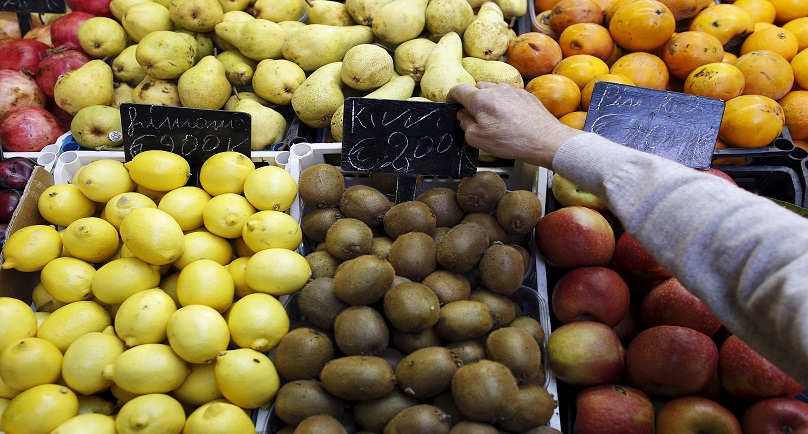Image:A fruit seller adjusts a price tag in a market in downtown Rome, in this November 14, 2011 file photo. REUTERS/Tony Gentile/Files
![]()
By Rebecca Howard
WELLINGTON (Reuters) – More than a century after the kiwifruit arrived in New Zealand, the fuzzy-skinned food is heading back to its roots in Asia.
The world’s largest kiwifruit exporter, New Zealand’s Zespri International Ltd, already sells around 20 percent of its output to China and is now preparing the ground to start producing there, looking to cut costs at a time when it expects its overall exports to hit record highs.
It also wants to tailor production to a market booming as an expanding middle class shifts to more healthy eating, consuming more fresh fruit and vegetables.
Starting commercial production in China would mark the first such step from New Zealand’s kiwifruit sector, a key part of a fruit industry which overall churns out the country’s sixth most valuable export. Although Zespri is cautious about moving too fast as it wants to ensure the varieties of kiwifruit it has developed are not leaked to other growers in China.
“There’s an obvious strategic advantage for us at sometime in the future to be producing Zespri quality kiwifruit out of China and selling it locally,” Chief Operating Officer Simon Limmer said by telephone.
Kiwifruit, which used to be known as Chinese gooseberries as they were originally from that country, were brought to New Zealand in the early 1900s and renamed after the nation’s round flightless bird. The food now generates around NZ$1 billion ($660 million) in export revenue for New Zealand each year, more than double the amount from fresh apples.
China is already the world’s largest producer and consumer of kiwifruit, growing between 1.3 and 1.5 million tonnes a year, versus Zespri’s output of nearly 400,000 tonnes.
The Asian giant is the Tauranga-based co-operative’s fastest growing market, with exports to the country expected to soar 40 percent in the year to March 31.
New Zealand was the first OECD country to sign a free trade agreement with China, and Zespri has reaped the benefits. In October, China once again overtook Australia as New Zealand’s top annual export destination, with shipments led by beef, milk powder and kiwifruit.
Zespri competes with Chinese growers such as Joyvio Group, a subsidiary of conglomerate Legend Holdings.
“(China) will be our biggest market by volume next year and probably by volume and value the following year,” said Limmer. Japan is currently Zespri’s largest export market.
NOT SO SPEEDY
Zespri in November signed a memorandum of understanding with the local government in the central Chinese province of Shaanxi to assess local kiwifruit varieties. It plans to hold growing trials there in early 2016.
But Limmer said the first commercial crop would probably be “a few years away” as developing quality fruit is not a speedy process.
“Everywhere we grow kiwifruit is different and requires a different approach. We need to learn to adapt and bring what we know and make it relevant to what we are doing in China,” Limmer said. “We are bringing our know-how and combining it with local resources in the local environment.”
Mark Kilgour, a senior lecturer from New Zealand’s University of Waikato, said there would be significant cost benefits from growing in China.
“New Zealand is a very high cost site for production and we have high transportation costs, plus our dollar is all over the place because we are such a small market. Those are all compelling reasons for offshore production,” he said.
Protecting Zespri’s intellectual property and safeguarding its reputation would be key concerns when starting output in China. In the early 2000s, the company attempted some growing trials but the fruit was leaked into general production “which is a massive issue for us”, said Limmer.
He added that Zespri did not plan to take its new varieties to China in the short term due to such concerns.
(Reporting by Rebecca Howard; Editing by Lincoln Feast and Joseph Radford)
Copyright 2015 Thomson Reuters. Click for Restrictions.


